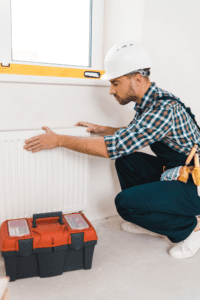Between 2012-16, home heating equipment was involved in 15% of all home fires and caused over $1 billion in property damage. While heating systems should provide comfort and convenience, there are unfortunate instances when the heat in buildings can become a serious problem. The risks highlight the pressing need for effective and consistent HVAC maintenance.
There are three major problem categories that your central heating system may contribute to: economic, environmental, and safety. It’s impossible to eliminate the risks entirely, but with a modern system correctly installed in your home, the risks can be minimized. With the right system and the proper care, you can prevent these issues from becoming a serious concern.
The Economic Impact of a Problem System
 When functioning in cold weather, your heating system will cost a significant amount of money. That base cost is simply the regular rate that you should be paying when there’s no unnecessary waste, and is dependent on the size of your building, how hot you set your system, and the type of heating system you have. There are additional factors that play a role, including how well-insulated your home is and the ambient temperature, but both of those are external to the heating system.
When functioning in cold weather, your heating system will cost a significant amount of money. That base cost is simply the regular rate that you should be paying when there’s no unnecessary waste, and is dependent on the size of your building, how hot you set your system, and the type of heating system you have. There are additional factors that play a role, including how well-insulated your home is and the ambient temperature, but both of those are external to the heating system.
If you see your heating bill creeping up, it may be the first sign of a malfunction or other issue. If left untreated, it can continue to increase and cost you hundreds of dollars in wasted heating expenses on top of the cost of repairing the faulty equipment. Be diligent when it comes to tracking your bills, because you never know when an unusually high bill may indicate a worse problem down the line.
You can work to limit these problems by speaking with an HVAC specialist about your current system. They can propose alternatives that can save you money in the long run, or else become familiar with your system and walk you through a proper maintenance routine to keep it running efficiently.
The Environmental Effects of Heat in Buildings
Both inside and outside the home, your heater can have a significant environmental impact. For gas or oil heaters, a malfunction can cause them to have a dirty exhaust, both wasting gas and excessively expelling pollutants. Some people seek to avoid this issue with solar-powered radiant heat, but those systems are rather expensive, and during the height of winter, they often require additional support from another heat source.
Forced air of any kind can also be a problem on the interior environment of your home or office. Those with sensitive skin may develop or worsen conditions such as dry skin, eczema, or psoriasis. Those families with children who are diagnosed with asthma must also pay additional attention to the impact that blowing dust throughout the home can have. In both these cases, regular maintenance and properly changing all filters are essential steps to minimize irritants.
Avoiding the Most Dangerous Malfunctions
There are other risks more dangerous than dry skin or wasted dollars. Faulty heating equipment is responsible for tremendous damage to homes, businesses, and lives. Hundreds of people die every year from malfunctioning heating equipment, so the importance of responsible usage and maintenance cannot be overstated. Too many people know a story about someone who recklessly left a space heater near a flammable object such as a blanket or clothing, and it caught fire.
Older furnaces may be prone to weakened seals, valves, and vents. One possible result of this is an influx of too much fuel, leading to over-combustion and a serious risk of explosion or fire. Another potential issue for a gas furnace is that the spark may fail, but a faulty machine could continue pumping gas into the system. It could lead to a significant danger of air toxicity within your home, threatening not only children and the elderly, but also healthy adults.
Take the time to read safety manuals that describe safe usage, purchase equipment only from reputable sources, and educate everyone in your home about responsible usage of the heating system. All it takes is one accident or careless error to start a blaze that could burn your house down. We can’t emphasize the importance of fire safety enough, as fire doesn’t give you second chances once a spark turns into a flame.
Recognizing the Dangers and Acting to Stay Safe
The best way to avoid problems with your system from posing a risk to your wallet or your welfare is to learn how to recognize the red flags. As with so many things in life, diligence and being proactive will help you prevent costly issues. Each heating system is unique, so rely on a trained HVAC specialist to help you discern the most reliable system for your home or office. They can work with you to ensure that you reduce the risks of economic, environmental, and safety problems in your home.

